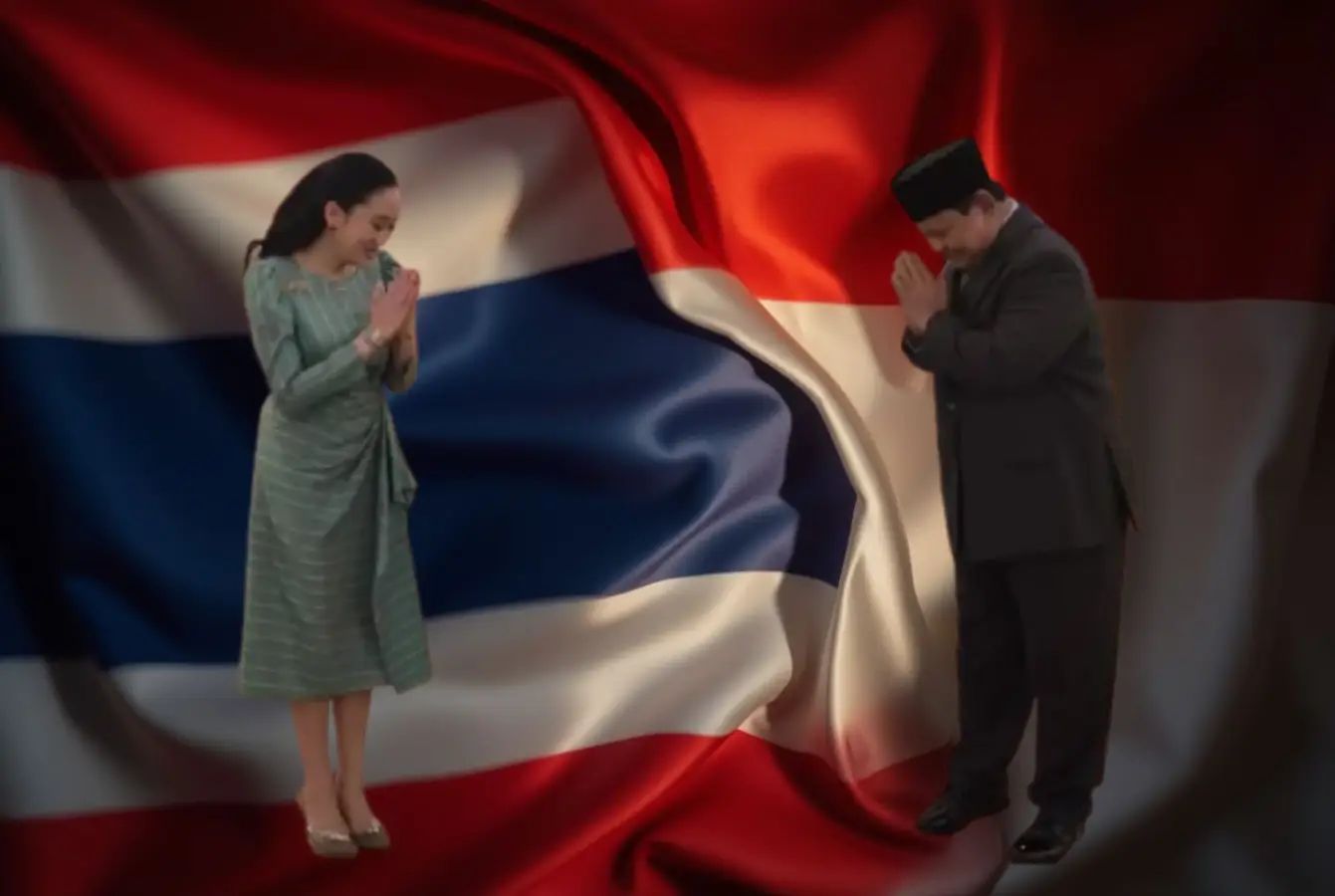Thai Prime Minister Paetongtarn Shinawatra and Indonesian President Prabowo Subianto have elevated bilateral relations to a strategic partnership, marking a significant milestone in the 75th anniversary of diplomatic ties between the two nations. The agreement, formalized during a meeting at Government House in Bangkok on May 20, 2025, underscores a shared commitment to deepen cooperation across health, trade, security, and regional stability within the ASEAN framework.
Health Cooperation Takes Center Stage
One of the key outcomes of the meeting was the signing of a Memorandum of Understanding (MoU) on health cooperation between Thailand’s Ministry of Public Health and Indonesia’s Ministry of Health. Signed by Thailand’s Public Health Minister Somsak Thepsuthin and Indonesia’s Foreign Minister Sugiono, the MoU aims to strengthen health systems, enhance primary healthcare services, and combat communicable diseases. It also focuses on securing pharmaceutical supplies, improving health financing mechanisms, and promoting health tourism—a growing sector in both countries.
The agreement reflects a mutual recognition of the importance of resilient health infrastructures, especially in the wake of global health challenges. Thailand, with its long-standing experience in universal health coverage since 2001, expressed readiness to share expertise with Indonesia, particularly as both nations collaborate under the United Nations’ Foreign Policy and Global Health Group.
A Strategic Partnership for the Future
The elevation of bilateral ties to a strategic partnership signals an ambitious roadmap for Thailand and Indonesia, two influential members of the Association of Southeast Asian Nations (ASEAN). Prime Minister Paetongtarn, hosting President Subianto on his first official visit to Thailand, emphasized the historical depth of their friendship, tracing it back over 150 years to King Chulalongkorn’s visit to Java in 1871. The leaders co-chaired the inaugural leaders’ consultation, a new mechanism designed to ensure regular high-level exchanges, and tasked their foreign ministries with drafting a strategic partnership action plan by the end of 2025.
This partnership extends beyond symbolic gestures, targeting tangible outcomes across multiple sectors. Both leaders agreed to promote regular high-level engagements and maximize existing bilateral mechanisms, ensuring sustained dialogue. The strategic partnership also aims to serve as a model for ASEAN cooperation, reinforcing the bloc’s centrality amid global geopolitical uncertainties.
Boosting Trade, Investment, and Tourism
Economic collaboration emerged as a cornerstone of the discussions, with bilateral trade already reaching US$18 billion (594.88 billion Thai Baht, approximately US$16.8 billion) in 2024. Prime Minister Paetongtarn expressed optimism about further growth, highlighting the potential for mutual benefits not only for Thailand and Indonesia but for the broader ASEAN region. To this end, Thailand will host the first Joint Trade Committee meeting later in 2025 to explore new areas of economic cooperation.
The leaders encouraged closer ties between public agencies and private sectors to unlock investment opportunities. Paetongtarn also thanked President Subianto for supporting Thai businesses in Indonesia, requesting continued fair treatment to facilitate their operations. Tourism, a vital economic driver for both nations, received a significant boost with the launch of new flight routes connecting Bangkok to Surabaya and Medan, alongside a planned Phuket-Medan route. These connections are expected to enhance tourism links, particularly between Thailand and eastern Java and northern Sumatra, with tourism agencies tasked with promoting these routes and exploring additional destinations.
Food security and energy cooperation also featured prominently. Both countries committed to revitalizing partnerships in agricultural trade, the halal industry, and sustainable fisheries. On energy, the focus shifted to renewable and green initiatives, aligning with global sustainability goals and addressing regional energy security concerns.
Security and Regional Stability
Security cooperation formed a critical pillar of the strategic partnership, with agreements to enhance military and police collaboration. The leaders discussed joint efforts in defense industry collaboration and intensified police cooperation to combat transnational crimes such as online fraud, human trafficking, and drug smuggling—issues that plague the region. These initiatives aim to bolster safety and stability, not just bilaterally but across ASEAN borders.
On the regional stage, Thailand and Indonesia reaffirmed their commitment to ASEAN unity and centrality. They pledged to support inclusive economic and social integration while enhancing regional stability. A shared concern for Myanmar’s ongoing crisis prompted both nations to commit to working with Malaysia, the current ASEAN chair, to support peace efforts. As close neighbors and friends of Myanmar, they emphasized ASEAN’s leading role in fostering a peaceful, stable, and unified resolution to the conflict.
Historical Ties and Personal Diplomacy
The personal rapport between Prime Minister Paetongtarn and President Subianto underscored the warmth of the discussions. Paetongtarn expressed her honor in welcoming Subianto, noting the significance of his visit during the 75th anniversary of diplomatic relations. She also conveyed her hope for a future official visit to Indonesia, signaling a desire to maintain the momentum of this renewed partnership.
The historical ties between the two nations provided a poignant backdrop to the meeting. The enduring friendship, symbolized by cultural and diplomatic exchanges over centuries, continues to shape contemporary relations. Thai government spokesman Jirayu Houngsub, summarizing the key points of the joint press conference, highlighted how these historical connections inform the forward-looking vision of both leaders.
ASEAN’s Role in a Turbulent World
The Bangkok meeting comes at a time when ASEAN faces mounting challenges, from economic uncertainties to geopolitical tensions. Thailand and Indonesia, as two of the bloc’s largest economies and influential voices, are positioning themselves as stabilizing forces. Their commitment to ASEAN centrality—ensuring the bloc remains the primary platform for regional dialogue—sends a clear message about the importance of collective action.
Analysts suggest that the strategic partnership could serve as a blueprint for other ASEAN member states seeking to deepen bilateral ties while contributing to regional goals. If successfully implemented, the action plan and enhanced cooperation mechanisms could pave the way for more robust intra-ASEAN collaboration, particularly in areas like health, trade, and security. However, challenges remain, including aligning national interests with regional priorities and navigating external pressures from global powers vying for influence in Southeast Asia.
Looking Ahead
The outcomes of the Bangkok meeting between Thailand and Indonesia mark a pivotal moment for bilateral relations and ASEAN cooperation. As both nations work to finalize their strategic partnership action plan and implement agreements on health, trade, and security, the region watches closely. The renewed flight routes, military collaborations, and joint efforts on Myanmar’s crisis reflect a multifaceted approach to partnership—one that balances economic ambitions with geopolitical realities.
As Prime Minister Paetongtarn and President Subianto chart this new course, questions linger about how their vision will unfold in practice. Will the strategic partnership deliver the promised mutual benefits, and can it strengthen ASEAN’s resilience in an uncertain world? For now, the spirit of friendship and shared purpose offers a hopeful foundation for what lies ahead.
















